The 55th Session of the Human Rights Council
26 February – 05 April 2024
Agenda Item 2 – Annual report of the United Nations High Commissioner for Human Rights and reports of the Office of the High Commissioner and the Secretary-General
Presentation of Item 2 country reports, HC global update followed by Item 2 general debate
12th meeting of the Human Rights Council
4th March 2024
By Tareq Jarrad/ GICJ
Executive Summary
On 4 March 2024 during the 12th and 13th meeting of the Human Rights Council, concerned countries shared their country reports regarding the situation of human rights locally, followed by the oral update of the High Commissioner about human rights globally.
Mr. Volker Türk, United Nations High Commissioner for Human Rights, presented a comprehensive update on the situation of human rights in many countries around the world. Central to his remarks were violations of human rights in armed conflicts around the world which affect the right to peace of all people as the mother of all other rights. He shared an encompassing update on various other topics, inter alia, elections, crack downs of political opponents and journalists, gang violence, LGBTQ+ rights, women’s rights, the right of development and racial discrimination.
Many delegations expressed their commitment to the work of the office of the High Commissioner of human rights and expressed their support to the finding of the commissioner in most of its aspects. Some states have expressed the need for the office of the High Commissioner to take into account cultural differences in its report and called for the application of human rights away from double standards. Few other states have expressed their concerns that the office’s report goes beyond its mandate and argued for the need to comprehensively address human rights in line with the UN charter and non-intervention of domestic affairs.
The assault on Gaza and the violations of human rights by Israel in the occupied Palestinian territories has been among the most addressed topics by the delegates present during the discussion from various regions. Additionally, the war in Ukraine, as well as the conflict in Western Sahara and Sudan have also been addressed by speakers.
Honduras country report
Ms. Angélica Álvarez, the secretary of state for human rights in Honduras welcomed the High Commissioner’s report and recognised the challenges the country faces, reiterating the country’s commitment to the protection of human rights. The government representative presented items of interest where its government has been working on improving the human rights situation, investing in electricity, agricultural development and strengthening growth, appointing the prosecutor general to ensure investigation of high impact cases, electing officials to courts of audit, implementing security policies that are based on human rights, and fighting against organised crime, among others. In protection of children, she affirmed that the government of Honduras has taken actions in creating a ministry of children and family to uphold institutional mechanisms and ensure human rights of the child and family are protected.
She reaffirmed that achieving Sustainable Development Goals (SDGs) – especially those in combating poverty – requires evidence-based solutions, as well as adopting a cooperative approach and non-interference to build trust and credibility of human rights mechanisms. She also reiterated her country’s commitment to protecting human rights by adopting necessary measures recommended in the High Commissioner’s report.
The representative of Honduras pointed out during the debate the importance of multilateralism to advance human rights schemes and to strengthen measures that countries have taken to implement human rights mechanisms. She highlighted the steps Honduras has taken in public investment and tax reforms to address corruption in both the public and private sectors. These measures aim to recover resources needed to boost productive investments and to reverse the regressive tax system that has disproportionately affected the most vulnerable populations.
Remarks on Colombia
The representative of Belgium commended the country on the progress on transitional justice during the debate and expressed the country’s regret on the high level of violence noted there, encouraging Colombia to implement the 2016 peace agreement. Additionally, the representative of Finland described Colombia’s commitment to the human rights commission country’s office as exemplary.
Ms. Ana María Rodriguez on behalf of the Colombian Commission of Jurists shared that there has been significant progress towards peace in Colombia. She noted that the 2017 agreement is being implemented very slowly, especially on gender and ethnic issues, adding that decisive efforts are needed to provide an environment for new peace conversation. She expressed her organisation's regret that the situation has worsened due to the expansion of armed groups and criminal structures and violence against women and children. She urged Colombia to make progress on implementing human rights policies and recommended a key role of the office of the High Commissioner in this regard.
Remarks on Guatemala
The Speaker of International Service for Human Rights, Ms. Lourdes Gómez Willis, stated that state institutions in Guatemala have been seriously undermined despite the change of government. She expressed concerns over the way judges’ appointments affect the independence of justice and undermine democratic change. She highlighted that the discrimination against indigenous people and people of African descent in the justice system remains of high concern. In addition, human rights defenders continue to be attacked and prosecuted. She urged the Guatemalan government to create an action plan to accept special procedures and visits, implement UPR recommendations, and request a visit from the High Commissioner.
The Speaker on behalf of the International Federation for Human Rights Leagues, Mr. Juan Francisco Sandoval Alfaro, who is in exile, stated that over 100 criminal cases against high level politicians have remained unresolved since 2019, requiring a judicial reform. He asked for support from international bodies to halt the prosecution of academics and students.
Report of Mr. Volker Türk, United Nations High Commissioner for Human Rights
On March 4th during the 12th meeting of the Human Rights Council in his oral update on the situation of human rights globally, the High Commissioner stated that there are 55 conflicts around the world that are flaring, widespread violations of International Humanitarian Law (IHL) and International Human Rights Law (IHRL) are generating devastating impact on millions of civilians. Displacement and humanitarian crises have already reached an unprecedented scale and all these conflicts have regional and global consequences.
He added that Israel’s war on Gaza has explosive impact across the middle east and has generated a dangerous spell in neighbouring counties, further adding that other conflicts in Africa such as in the Sahel and Sudan could escalate sharply and have already resulted in a large number of refugees. The militarisation in the Korean peninsula raises dangerous threat levels, attacks in the red and black sea are disturbing the global maritime trade and driving up prices of goods, further adding to the economic pain inflicted in underdeveloped countries.
The High Commissioner reiterated that the right to peace is the mother of all human rights, he added that without peace all other rights are quashed. He expressed the urgency to counter war, fear and escalating hatred and hostility that bring short term profit for few while damaging the lives and rights of millions. He affirmed that we need to regain the mindset of peace in the face of de-escalation, keeping communication channels open and rebuilding trust in the short term, and healing and reconciliation in the long term.
On Syria, he highlighted that there is still no clear path for justice and peace and that violence is, once again, on the rise. He noted that his office is assisting the secretary general in establishing an independent institution dedicated to missing persons, which will pave the way for survivors and victims’ families right to truth.
On Ukraine, his office has identified more than 10 000 civilians’ deaths and many more injured since the beginning of the war in Ukraine two years ago. He added that recent Russian attacks have caused a steep rise in civilian casualties across Ukraine and the repressive measures of Russian in the occupied territories are leading to widespread fear.
On Latin America and the Caribbeans, he highlighted the impact of gang violence on the lives and rights of millions of people, including in Honduras and Haiti, among others. He stressed the need for human rights based measures rather than military punitive ones to provide sustainable solutions. He added that issues such as corruption, poor governance, discrimination, and root causes of violence must be tackled with full participation of civil society.
The commissioner pointed out in his oral statement that 2024 could be a landmark for democratic principles. The only path for governance based on human rights is a full participatory democratic process in elections, which will be conducted in 60 countries around the world. The full participation of society elections ensures trust in the institution of governance in decision making as it is better informed and balances the needs of different groups. He urged all states to dismantle laws and practices that prevent women from holding power to achieve gender parity. He also emphasised the importance of ending arbitrary detentions and discrimination against political opponents, journalists, minority community members, activists, and civil society leaders, particularly in Bangladesh, the UAE, Pakistan, and India. This is essential for developing democracy and ensuring meaningful participation for everyone. He added that it is important for the authorities in the United States of America to implement on all levels the recent recommendations by the UN human rights committee to ensure that suffrage is nondiscriminatory, equal and universal. He emphasised the equal value of every citizen’s vote, and yet fourteen states continue to have disproportionate and discriminatory policies that restrict the full participation of voters of African descent.
On racism and discrimination, the commissioner expressed the need of many states to adopt comprehensive measures against police violence and discrimination. Data from the European Union, United States and Brazil shows high levels of perception of discrimination and deaths of people of African descent. The High Commissioner was also concerned about deeply racist beliefs in Europe and North America among the public, especially of the so-called notion of “great replacement theory” which directly influences perpetrators of violence. He added that multiculturalism is not a threat but the history of humanity and deeply beneficial for all. He also expressed the need of respecting the rights of LGBTQ+ communities worldwide and the need for states to take preventative measures against any forms of discrimination in this area.
In his concluding remarks, he emphasised that peace, such as development, is built and nourished through rights. By upholding and advancing the full spectrum of human rights including the right to development and sustainable environment, states can craft solutions that are durable because they respond to the universal truth of equality and to the inextinguishable desire for freedom and justice. He added that among the greatest achievements of humanity over the last 75 years has been the recognition of addressing all human rights in all countries, which is not a la carte menu but a matter of international concern.
General Debate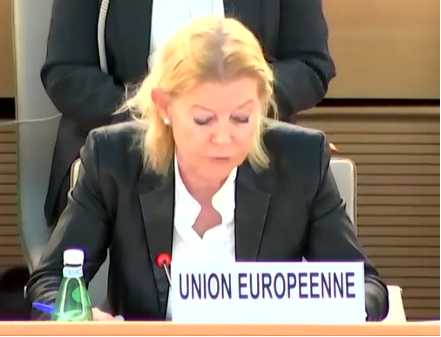
The general debate, following the High Commissioners’ global update, was opened by the speaker of the delegation of the European Union on behalf of half of EU member states and groups of countries. The speaker reiterated her concentration on the Russo-Ukrainian war. She expressed the support of the European Union in Colombia to achieve peace and curb violence. She expressed that the EU is ready to support and strengthen the rule of law and protection of human rights in Guatemala. She also highlighted the alarming number of killings of environmental activists in Honduras as a matter of high concern.
The EU remains concerned about the human rights violations in many countries, including Sri Lanka, Egypt, Lebanon, Yemen, and Vietnam, among others. The EU emphasises the importance of the rights of Karabakh Armenians and the sustainable return of refugees to Nagorno-Karabakh.
The delegate of Pakistan in his statement on behalf of the Organization of Islamic Cooperation (OIC) expressed his condemnation of Israel’s crimes by Israeli forces in the occupied Palestinian territory (OPT) and stressed the need of accountability for all violations of International Human Rights and Humanitarian law and reminded the responsibility of all states in light of the provisional measures adopted by the International Court of Justice (ICJ) regarding the genocide in Gaza. On Kashmir, he argued for India to comply with all applicational Security Council resolutions and address all measures provided by the OCHR on Kashmir. He also asked the council to ensure justice and accountability for the Rohingya people and their right to return to their homes and land. He also condemned the repeated acts of the religious hatred manifested in the acts of desecration of the holy Quran and urged states to take legal measures to stop such acts.
The delegate of Qatar on behalf of the Gulf Cooperation Council (GCC) shared the same concerns of the High Commissioner on the human rights situation in a number of countries and reiterated the important role of the OHCHR to help overcome obstacles, which the GCC supports, in addressing human rights through technical assistance. She asked for the help of the High Commissioner to achieve an immediate ceasefire in Gaza and to facilitate stopping the perpetration of genocide, lift the siege and provide humanitarian assistance. She called on the office of the High Commissioner to document all violations in OPT. She also underlined the difference between freedom of expression and what goes beyond that and expressed the need to combat religious hatred and racial discrimination. On behalf of her country's position, she further expressed the need to strengthen human rights in order to achieve the sustainable development goals through international cooperation far from politicisation, selectivity and double standards.
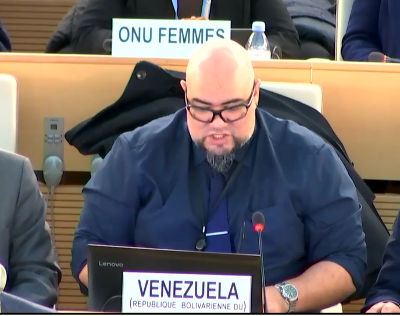 The delegate of Venezuela on behalf of a group of countries expressed a categorical rejection of double standards in the field of human rights as such an approach presents a harmonious progress in this field. This group insists that the only way to advance the human rights situation is through fostering dialogue and cooperation, engagement, national ownership, and each process aimed at strengthening human rights on national and international trends and unilateral trends must be rejected.
The delegate of Venezuela on behalf of a group of countries expressed a categorical rejection of double standards in the field of human rights as such an approach presents a harmonious progress in this field. This group insists that the only way to advance the human rights situation is through fostering dialogue and cooperation, engagement, national ownership, and each process aimed at strengthening human rights on national and international trends and unilateral trends must be rejected.
The delegate of Egypt on behalf of the Arab group, urged the High Commissioner to deal with all human rights issues on equal footing and in an objective manner while taking into account the Israeli aggression and the humanitarian catastrophe in Gaza. He expressed that there is a serious double standard in addressing the situation in Gaza and called on the international community, including UN institutions, to work towards an immediate ceasefire in Occupied Palestine and to allow for unconditional access of humanitarian assistance in Gaza to prevent genocide in accordance the ICJ’s decision. He addressed the urgent need for an immediate ceasefire in Sudan. He also expressed the group’s concern over the burning of the holy Quran and the targeting of mosques and churches in armed conflicts which cannot be justified. He also expressed concern over the situation of refugees and migrants in European countries and asked the High Commissioner to take time to condemn any acts that are based on religious hatred. Regarding the OHCHR reports, he expressed the need for the reports to consider the cultural and religious characteristics of countries and nations and reaffirm the importance of technical cooperation and capacity building programs as the most sustainable way to enhance human rights.
The delegate of Uganda on behalf of the Non-Aligned Movement shared the concerns of the High Commissioner about multiple forms of discrim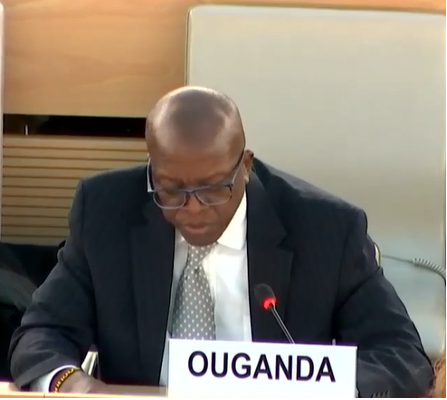 ination across many regions and expressed grave concerns about the deterioration of human rights in the OPT, especially the humanitarian crisis in the Gaza Strip as a result of the aggression and siege of Israel since October. He further added the need for an immediate ceasefire and an end to the collective punishment of the civilian population. On the High Commissioner’s work, he emphasised the need to respect the right of all to choose values and principles appropriate to their people for the protection and promotion of human rights and the rejection of attempts of imposition of values on others under the pretext of universality of human rights. He reaffirmed the movement's commitment to work with the office of the High Commissioner to strengthen the credibility of human rights mechanisms and to build international order based on inclusion and diversity.
ination across many regions and expressed grave concerns about the deterioration of human rights in the OPT, especially the humanitarian crisis in the Gaza Strip as a result of the aggression and siege of Israel since October. He further added the need for an immediate ceasefire and an end to the collective punishment of the civilian population. On the High Commissioner’s work, he emphasised the need to respect the right of all to choose values and principles appropriate to their people for the protection and promotion of human rights and the rejection of attempts of imposition of values on others under the pretext of universality of human rights. He reaffirmed the movement's commitment to work with the office of the High Commissioner to strengthen the credibility of human rights mechanisms and to build international order based on inclusion and diversity.
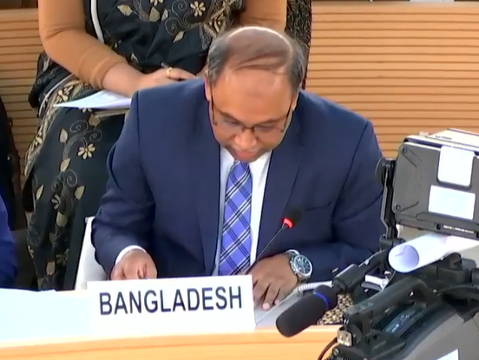 The delegate of Bangladesh on behalf of more than 60 cross-regional countries, expressed the need to urgently address the massive human rights crisis and humanitarian catastrophe. He added that the forced displacement of the civilian population in Gaza stands in violation of article 49 of the 4th Geneva Convention and must be stopped immediately. He emphasised that the continued violations on the land of the Palestinian people is a process that began in 1948 and is affecting their rights, the right to self-determination, the right to housing and clean water, the right to health education and work, and freedom of movement, among other things. He also urged the council to keep focus on the Rohingya crisis until justice, accountability, and sustainable repatriation for the Rohingya is achieved.
The delegate of Bangladesh on behalf of more than 60 cross-regional countries, expressed the need to urgently address the massive human rights crisis and humanitarian catastrophe. He added that the forced displacement of the civilian population in Gaza stands in violation of article 49 of the 4th Geneva Convention and must be stopped immediately. He emphasised that the continued violations on the land of the Palestinian people is a process that began in 1948 and is affecting their rights, the right to self-determination, the right to housing and clean water, the right to health education and work, and freedom of movement, among other things. He also urged the council to keep focus on the Rohingya crisis until justice, accountability, and sustainable repatriation for the Rohingya is achieved.
The Dutch delegate called upon all states conducting elections in 2024 to ensure freedom of expression and assembly and effectively protect civic space and civil society before, during, and after elections.
The delegates of Luxemburg, Costa Rica and Indonesia emphasised the importance of economic development as a path to ensure the realisation of human rights. Additionally, many countries have expressed the important role of the High Commissioner during the 75th anniversary of the universal declaration of human rights, and his balanced approach in addressing social, economic, and cultural rights.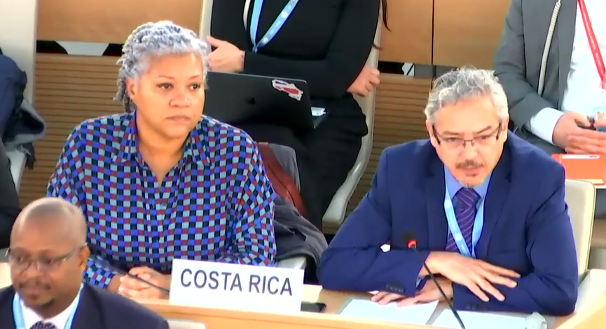
Various states expressed the need for multilateralism and international approach to promote the interdependencies of all human rights, their protection and development based on universality and equality. There have also been additional calls against the politicisation of human rights and member states asked the council to discourage such practices. Emphasis has also been put, by many speakers, on the interconnections between human rights and social and economic development, calls for dialogue to be carried out through mutual respect and equality to foster human rights away from selectivity and double standards. The Sri Lanka delegate called out the Council on its disproportionate security of nations from the global south disregarding violations elsewhere.
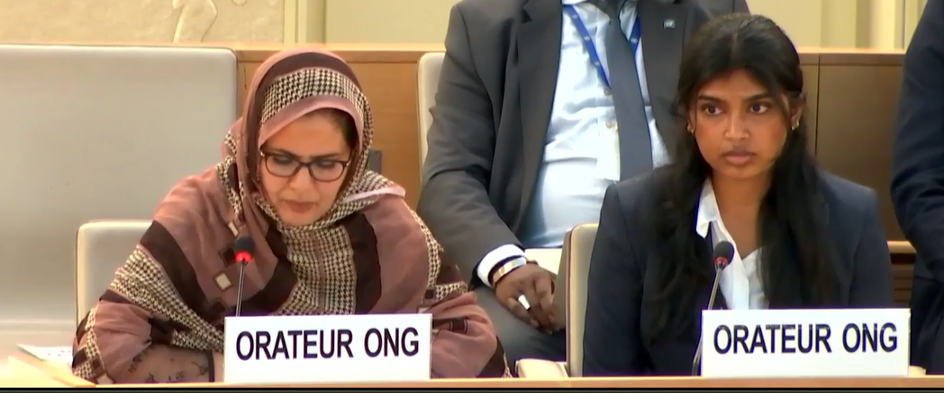 Civil society organisations joined the debate and contributed with various speakers from across the world. Many civil society groups called for justice, accountability, and retribution for many victims of state violence around the world. The Asia forum for Human Rights and development stated that the human rights in Sri Lanka has deteriorated since the report from September 2023. New laws in the country evoke fears of past violations and add a chilling effect on civil and political spaces. The representative also expressed the need for justice and accountability of war time crimes and put an end to impunity that fosters corruption and economic crimes.
Civil society organisations joined the debate and contributed with various speakers from across the world. Many civil society groups called for justice, accountability, and retribution for many victims of state violence around the world. The Asia forum for Human Rights and development stated that the human rights in Sri Lanka has deteriorated since the report from September 2023. New laws in the country evoke fears of past violations and add a chilling effect on civil and political spaces. The representative also expressed the need for justice and accountability of war time crimes and put an end to impunity that fosters corruption and economic crimes.
Position of Geneva International Centre for Justice
Geneva International Centre for Justice (GICJ) emphasises the urgent need for peace and calls for concerted efforts to counter war, fear, and hostility through dialogue, trust-building, and reconciliation. Upholding human rights is essential for crafting enduring solutions that address the universal aspirations for freedom, justice, and equality, crucial for global stability and development. GICJ also reiterates the call of many states for the need of dialogue to foster human rights worldwide away from double standards and on the basis of equality.







